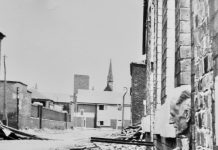A new campaign which will increase the numbers of defibrillators across Manchester city centre has been launched.
The pilot ‘HeartSafe’ Zone in Piccadilly, a joint venture between the North West Ambulance Service and the City Centre Management Company CityCo aims to ensure the general public are never more than four minutes away (walking distance) from potentially life-saving equipment and increasing their chance of survival to 80% in the event they have a cardiac arrest.
The pilot HeartSafe zone, covering the Piccadilly area of Manchester was officially launched at the Macdonald Manchester Hotel, runs from London Road to Piccadilly Gardens, has been made possible by the installation of automatic external defibrillators (AEDs) in city centre hotels across the Piccadilly area, which are accessible 24/7.
The installation of new defibrillators across Piccadilly means the public are now only a maximum of four minutes away from the nearest automated external defibrillator (AED) when in the HeartSafe zone.
The initiative has already seen over 80 staff trained to use AEDs including teams from Macdonald Manchester, Double Tree Hilton and Portland Thistle hotels. Network Rail is also on board with the scheme and currently has eight defibrillators located across Manchester Piccadilly train station.
The automated external defibrillator (AED) delivers an electric pulse through the chest to restore normal heart rhythm, and, if used within the first four minutes of a cardiac arrest, can give the casualty an 80 per cent chance of survival.
The defibrillator unit uses voice prompts and instructs the operator through each stage of using the device. The machine will not issue a shock on an individual who does not require one and is not in cardiac arrest.
Cardiologist Dr Aseem Malhotra who in 2013 called for defibrillators to be placed in all public buildings said: “Combined with effective CPR, the single most important factor determining survival in out of hospital cardiac arrest is the timely delivery of a life saving electric shock from an AED. This project has the potential to save thousands of lives.”
Last week, NWAS launched a campaign at the House of Commons to put life-saving skills on the national school curriculum and to install defibrillators in all public places and be made available in the same way fire extinguishers are. MPs, charity representatives and cardiac arrest survivors signed a pledge to support the campaign and this initiative is a prime example of how the Trust envisages the public installation of defibrillators.
Isabelle Peters, 22, who collapsed when her heart stopped in a high-energy exercise session at The Aquatics Centre in Manchester, attended the launch to offer a first hand account of how an AED saved her life. Staff at the Aquatics Centre trained in first aid used a defibrillator twice to give the aspiring opera singer and Royal Northern College of Music student electric shocks which restarted her heart in October 2013.







